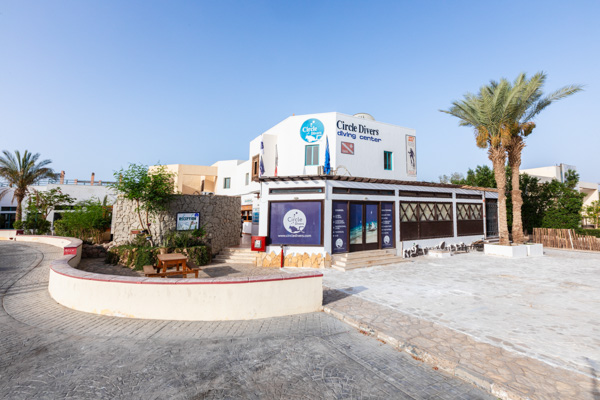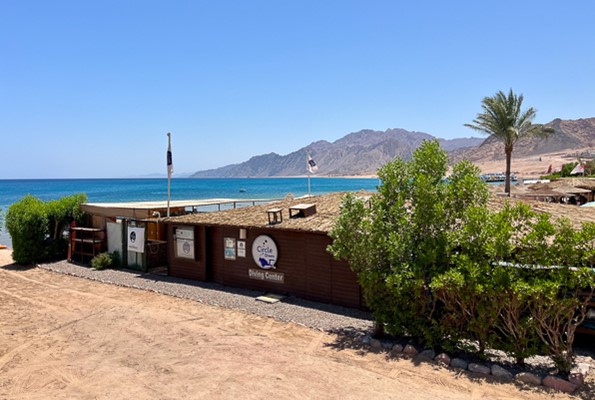How Much Water Should A Scuba Diver Drink?

Summer in the Sinai Peninsula can be unforgiving. Temperatures can often reach 40℃ or higher. It’s quite easy for visitors to Sharm el Sheikh or Dahab to become dehydrated. At Circle Divers, safety comes first, so we advise guests to drink more water to avoid any health issues. We’re not just talking about the dodgy stomach issues experienced by many holidaymakers, but for guests diving in the Red Sea, dehydration can be a serious issue contributing to many dive-related problems, such as fatigue, decompression sickness (DCS), or even impaired cognitive function. But how much water should a scuba diver drink when diving in Sharm or Dahab? Although there are no universally agreed amounts, for an average adult under normal circumstances, 2 -3 litres of water a day is recommended to be consumed. That includes water from both beverages and foods. When in warmer climates (an Egyptian summer, for example) or when being more active, as in scuba diving, that amount of water needed goes up to between 4 - 5 litres a day. Spaced throughout the day, it can be quite easy to drink 4 - 5 litres of water. From drinking water with your breakfast (rec. 500ml), we also recommend: 500 - 700 ml before your first dive 500 ml - 1 litre after each dive 500 - 750 ml after your last dive Additional water should be consumed depending on the climate (it’s HOT!), excessive sweating, and more demanding or energetic dives. Avoid fizzy, sugary soft drinks and high-caffeine energy drinks, which are known to dehydrate you, and don’t drink too much alcohol when diving the next day. NEVER DRINK ALCOHOL BETWEEN DIVES - the one or two deco beers at the dive centre apres dive should be okay, just don't carry on partying into the night if you are diving the next day. While pure water is one of the best sources of hydration, in high-energy environments such as diving in the Red Sea, electrolyte balance is important too. The best fluids for divers include: Water (cold or room temperature) Electrolyte tablets dissolved in water Coconut water is a source of natural electrolytes Oral rehydration solutions Yes, although staying hydrated is super important, you can also have too much of a good thing. Overhydration can lead to a condition called hyponatremia, a dangerous dilution of sodium in the blood. The key to staying healthily hydrated is a balanced, steady intake - not just chugging litre after litre all at once. Excessive thirst can also be an indicator of underlying health conditions such as poor blood sugar control or diabetes. Often, divers may dive into the water without realizing they are already dehydrated. Watch out for these warning signs. Dry mouth or lips Dark yellow urine Fatigue Headache Dizziness Cramps in your muscles Confusion A rapid heartbeat Low blood pressure Feeling faint or fainting Although it doesn’t sound too much fun, checking the colour of your urine can be a good indicator of your hydration level. Pale or light yellow and clear is what you are aiming for, not a dark or murky colour. One of the major side effects for scuba divers of not enough fluids is decompression sickness. DCS occurs when inert gases (mainly nitrogen) form bubbles in your body tissues during a dive or after diving. When you are dehydrated, your blood becomes thicker, making it harder for inert gases to be safely eliminated from your body tissues. Staying hydrated will help maintain good blood circulation and proper volume of blood. According to the DAN (Divers Alert Network) blog "Dehydration is suspected to play a role in many cases of decompression illness. It is a modifiable risk factor that divers should manage proactively." The water you dive in will be much higher in salt than the water you should be drinking. Exposure to saltwater can dehydrate any tissues it may come into contact with, and accidentally drinking or swallowing any seawater will increase dehydration. In addition, the air that you breathe when diving can increase dehydration. Compressed air is dry and dehumidified - every breath you take will contribute to fluid loss via your respiratory system. Always try to drink 4 - 5 litres of water a day, minimum, when diving. Bring a refillable water bottle with you. On all our boats, we have large containers or water cooling towers of drinking water available, and when shore diving with Circle Divers, we will always ensure plenty of water is available for you to refill. Staying hydrated is not just about comfort — it’s all about diver safety too. Drinking more water will reduce the risk of decompression sickness, support your brain function, keep your muscles working and help you to enjoy the underwater world of the Red Sea for longer.How Much Water Does a Person Need?
A Diver's Guide To Hydration
Drinks to Avoid
The Best Drinks For Hydration
Can You Drink Too Much Water?
How Can You Tell If You Are Dehydrated?
Early Signs
More Severe Signs
Hydration and Decompression Sickness (DCS)
But I Am Surrounded By Water, How Can I Be Dehydrated?
DIVE SAFE - DRINK MORE WATER


